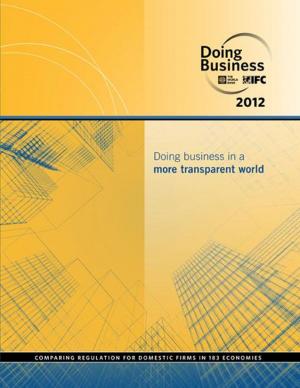Right to Work?
Assessing India's Employment Guarantee Scheme in Bihar
Business & Finance, Career Planning & Job Hunting, Labor, Economics, Economic Development| Author: | Puja Dutta, Rinku Murgai, Martin Ravallion, Dominique van de Walle | ISBN: | 9781464801310 |
| Publisher: | World Bank Publications | Publication: | March 3, 2014 |
| Imprint: | Language: | English |
| Author: | Puja Dutta, Rinku Murgai, Martin Ravallion, Dominique van de Walle |
| ISBN: | 9781464801310 |
| Publisher: | World Bank Publications |
| Publication: | March 3, 2014 |
| Imprint: | |
| Language: | English |
India's 2005 National Rural Employment Guarantee Act creates a justiciable 'right to work' by promising up to 100 days of wage employment per year to all rural households whose adult members volunteer to do unskilled manual work. Work is provided in public works projects at the stipulated minimum wage. This study asks: Are the conditions stipulated by the Act met in practice? How much impact on poverty do the earnings from the scheme have? Why might that impact fall short of its potential? How can the scheme bridge that gap? The bulk of the study focuses on the scheme's performance in one of India's poorest states, Bihar, where one would hope that a scheme such as this would help reduce poverty. The study finds that the scheme is falling well short of its potential impact on poverty in Bihar. Analysis of the study's survey data points to a number of reasons. Workers are not getting all the work they want, and they are not getting the full wages due. And participation in the scheme is far from costless to them. Many report that they had to give up some other income-earning activity when they took up work. The unmet demand for work is the single most important policy-relevant factor in accounting for the gap between actual performance and the scheme's potential impact on poverty. The study finds that there is very low public awareness of what needs to be done to obtain work. The study uses a randomized control trial of an awareness intervention–a specially designed fictional movie–to show how knowledge of rights and processes can be enhanced, as a key step toward better performance. While the movie was effective in raising awareness, it had little discernible effect on actions such as seeking employment when needed. This suggests that supply-side constraints must also be addressed, in addition to raising public awareness. A number of specific supply-side constraints to work provision are identified, including poor implementation capacity, weak financial management and monitoring systems.
India's 2005 National Rural Employment Guarantee Act creates a justiciable 'right to work' by promising up to 100 days of wage employment per year to all rural households whose adult members volunteer to do unskilled manual work. Work is provided in public works projects at the stipulated minimum wage. This study asks: Are the conditions stipulated by the Act met in practice? How much impact on poverty do the earnings from the scheme have? Why might that impact fall short of its potential? How can the scheme bridge that gap? The bulk of the study focuses on the scheme's performance in one of India's poorest states, Bihar, where one would hope that a scheme such as this would help reduce poverty. The study finds that the scheme is falling well short of its potential impact on poverty in Bihar. Analysis of the study's survey data points to a number of reasons. Workers are not getting all the work they want, and they are not getting the full wages due. And participation in the scheme is far from costless to them. Many report that they had to give up some other income-earning activity when they took up work. The unmet demand for work is the single most important policy-relevant factor in accounting for the gap between actual performance and the scheme's potential impact on poverty. The study finds that there is very low public awareness of what needs to be done to obtain work. The study uses a randomized control trial of an awareness intervention–a specially designed fictional movie–to show how knowledge of rights and processes can be enhanced, as a key step toward better performance. While the movie was effective in raising awareness, it had little discernible effect on actions such as seeking employment when needed. This suggests that supply-side constraints must also be addressed, in addition to raising public awareness. A number of specific supply-side constraints to work provision are identified, including poor implementation capacity, weak financial management and monitoring systems.















